Note You are currently viewing a previous version of this narrative statement as published in previous iterations of the KEF (KEF1 and KEF2). View the latest version
Institutional Context
Summary
The University of Derby makes a difference, impacting individual lives and communities. Our research informs social and economic change around the world and at home. Our talent drives innovation and opportunity, and for 170 years we have been part of the fabric of our city and our county.
Our graduates and academics power the region’s public sector, innovate across our city’s economy – from start-ups to the region’s industry giants – and research the issues that matter, locally and beyond, from the development of emerging technologies to influencing global sustainability.
As a champion of social mobility, we create routes to high-quality jobs by supporting firms to innovate and grow into sustainable and productive businesses that will create the jobs of the future.
Institutional context
The University of Derby is the only higher education institution in Derbyshire and our Strategic Framework articulates our role of ‘Being a Force for Positive Impact’ on the economic, social, cultural, educational and environmental prosperity of our home. We are proud to be amongst the first universities to pledge a commitment to produce a Civic University Agreement.
‘Opening Doors for Everyone’ is a key pillar of the University of Derby’s Strategic Framework which informs our strategic approach to knowledge exchange. We believe in the transformational nature of education and, as a champion of social mobility, we strive to inspire and create opportunities for all.
Our award winning Be The Boss programme supports the next generation of start-up businesses; we support SMEs to develop and realise their scale-up potential and we provide targeted innovation support through regional supply chains into the major manufacturers that are key to our regional productivity and sustainability.
A ‘better society’ and the well-being of our communities are also a key focus for our Knowledge Exchange activities. Our own Derby Theatre provides a platform to support local communities through the arts and culture, including the post-pandemic Derby Rises project. Our Social, Cultural and Legal research centre works with key stakeholders to promote applied social research focused on making a progressive difference to society.
As an anchor institution, we also recognise the impact of our physical presence on the vibrancy and regeneration potential of our city. Indeed, Derby City Council’s Economic Growth Strategy 2018-22 prioritises the development of a ‘University Quarter’ programme as part of a vibrant learning City.
The Derby and Derbyshire sub-region is geographically, economically and socially diverse. It is part of the D2N2 LEP area, one of the largest LEPs in England. There are a number of functional economic zones with varying drivers for growth. Collaboration is key to our strategic approach and needs are identified through active engagement with a range of stakeholder groups at a range of spatial levels.
We provide specialist support and expertise to the key employment sectors in our regional economy, for example: transport equipment manufacturing including rail and aerospace; health and social care; education and careers guidance; mineral products; supply chain and logistics; tourism. Our research, knowledge creation and innovation is also driving forward the sectors of the future: Data Science; Clean Growth; Bio-sciences; Advanced Manufacturing.
We have co-invested our own resources to deliver an ambitious programme of support for businesses. We are actively involved in 135 long-term knowledge exchange collaborations including Innovate UK KTPs and we have awarded £26.5m of capital investment to businesses in the East Midlands through our Invest to Grow Programme.
Our funded local growth programmes enable us to introduce SMEs to collaborative research and innovation and subsequently support them to move along the R&I value chain and build their capacity to engage, for example, with Innovate UK. Thus tangibly contributing to the Industrial Strategy target to increase business R&D spend.
For further information, please send queries to g.davis@derby.ac.uk
Local Growth and Regeneration
Summary of approach
The University of Derby is the only higher education institution in Derbyshire and our Strategic Plan articulates our role of ‘Being a Force for Positive Impact’ on the economic, social, cultural, educational and environmental prosperity of our home. We are proud to be amongst the first universities to pledge a commitment to produce a Civic University Agreement.
Alongside regional and government partners, we have co-invested our own resources to deliver a significant project portfolio to stimulate local regeneration and business growth.
As a champion of social mobility, we strive to create progression routes to high quality job outcomes whilst supporting local firms to innovate and grow into sustainable and productive businesses that create high value employment – jobs of the future.
Aspect 1: Strategy
The University of Derby is the only higher education institution in Derbyshire, therefore, our City and County are of primary strategic importance. We relish the civic responsibilities that this entails and our Strategic Plan articulates our role of ‘Being a Force for Positive Impact’ on the economic, social, cultural, educational and environmental prosperity of our home. Accordingly, the University of Derby was amongst the first universities to pledge a commitment to produce a Civic University Agreement.
‘Opening Doors for Everyone’ is another key pillar of the University of Derby’s Strategic Framework which informs our strategic approach to local growth and regeneration. We believe in the transformational nature of education and, as a champion of social mobility, we strive to inspire and create opportunities for all. The Department for Education has identified Derby as a social mobility cold spot (316th in the Social Mobility Index in 2017). Our Vice-Chancellor Chairs the Derby City Opportunity Area Board with the aim of bringing together local and national partners to break the link between a child’s background and where they get to in life. This imperative informs our approach to local growth and regeneration; striving to create progression routes to high quality job outcomes and supporting local firms to innovate and grow into sustainable and productive businesses that create high value employment – jobs of the future.
The Derby and Derbyshire sub-region is geographically, economically and socially diverse. There are a number of functional economic zones with varying drivers and capacity for growth. Collaboration is key to our strategic approach and local growth and regeneration needs are identified through active engagement with a range of stakeholder groups at a range of spatial levels.
Within our City, we collaborate closely with our City Council. As an anchor institution, we recognise the impact of our physical presence on the vibrancy and regeneration potential of our city. Indeed, Derby City Council’s Economic Growth Strategy 2018-22 prioritises the development of a ‘University Quarter’ programme as part of a vibrant learning City:

Across the wider Derbyshire sub-region, the University is a member of the Derbyshire Economic Partnership which brings together economic development agencies and other relevant organisations to strengthen the economy and tackle deprivation through the county.
Our campus network stretches from Derby City across to Chesterfield and Buxton in the north of the County. The major redevelopment of strategic sites in these Derbyshire towns (around the key employment sectors of health and tourism) has led to further collaborative working in response to specific local needs. For example, collaboration with Chesterfield Borough Council in response to the opportunities presented by HS2 and partnership working with High Peak Borough Council on the regeneration of Buxton as a key town and tourist hub in the Peak District.
Derby and Derbyshire are situated within the D2N2 Local Economic Partnership. D2N2 is one of the largest LEPs in England with a population of more than 2 million. Alongside the two other HEIs in D2N2, we proactively participate in LEP structures from our Vice-Chancellor at Board level through to working groups on the development of the evidence base behind a new Local Industrial Strategy.
We also actively engage with wider regional level structures both at strategic and delivery levels. Our engagement with the Midlands Engine partnership is predominantly co-ordinated through the Midlands Enterprise Universities group which works to drive productivity and growth in the Midlands through skills, innovation and enterprise.
The Covid-19 pandemic has only strengthened our engagement and commitment to support Local Growth and Regeneration evidenced through our participation on recovery boards at sub-regional and regional level and delivery of practical support using University facilities and resources.

Aspect 2: Activity
Since 2015/16 the University of Derby has delivered a step-change in its activity to support local growth and regeneration.
HE-BCIS Table 3 |
14/15 | 15/16 | 16/17 | 17/18 | 18/19 |
|---|---|---|---|---|---|
| Regeneration and Development Programme Income | £2.447m | £9.013m | £11.932m | £5.985m | £6.667m |
This has been driven through a collaborative approach to unlock regional development funding to deliver a holistic package of local growth projects. New collaborations have been developed with a range of both HE and non-HE partners within and beyond the D2N2 LEP area to ensure that SMEs in our region have access to the breadth and depth of support that they need.
The University of Derby has committed £5.6m of its own resources to secure co-investment from regional funding sources. This has ensured that activity meets identified strategic priorities and needs. The following logic model illustrates our approach:
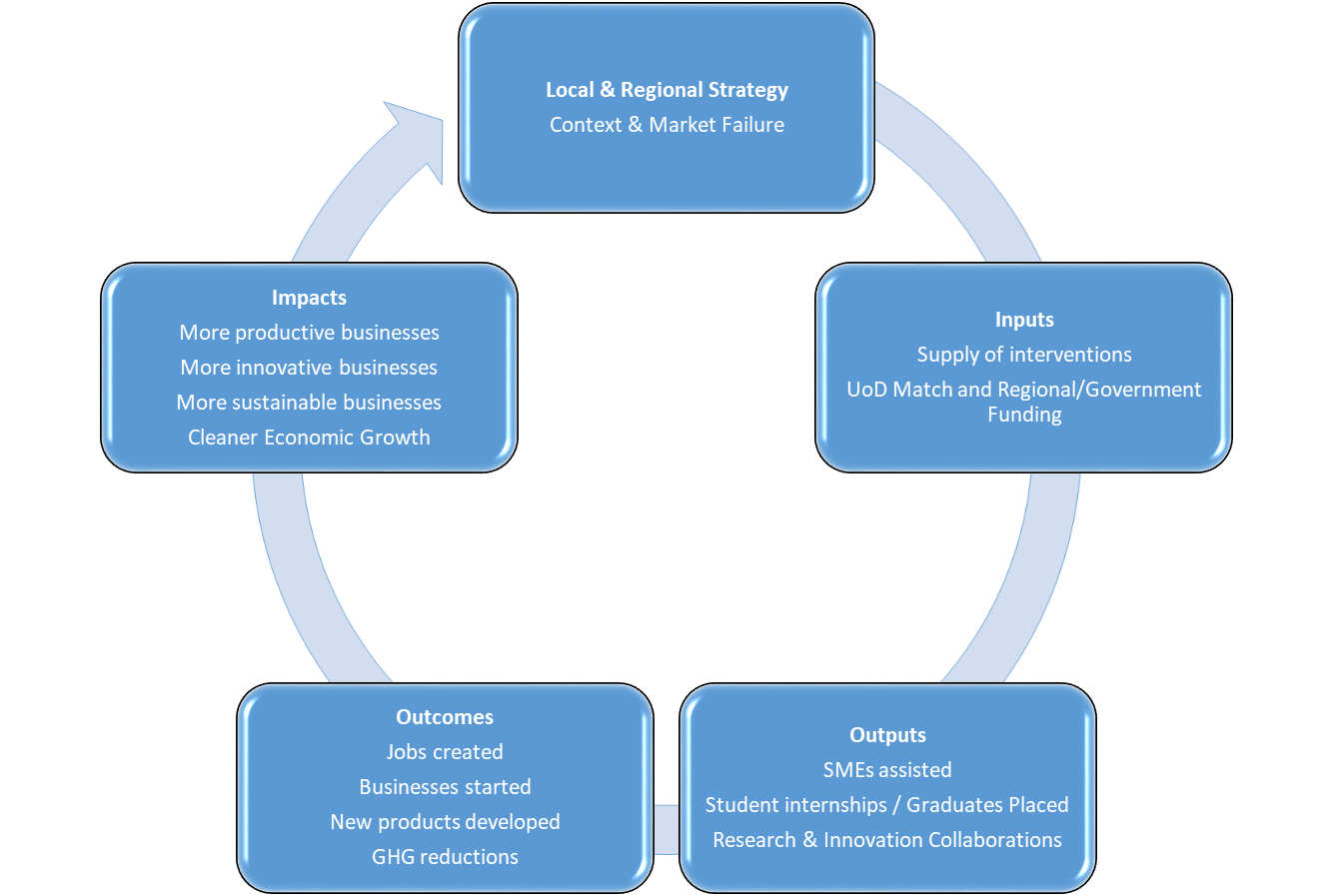
Our Local Growth project portfolio enables us to provide a critical mass of support to SMEs in our region across a range of interventions as illustrated below:
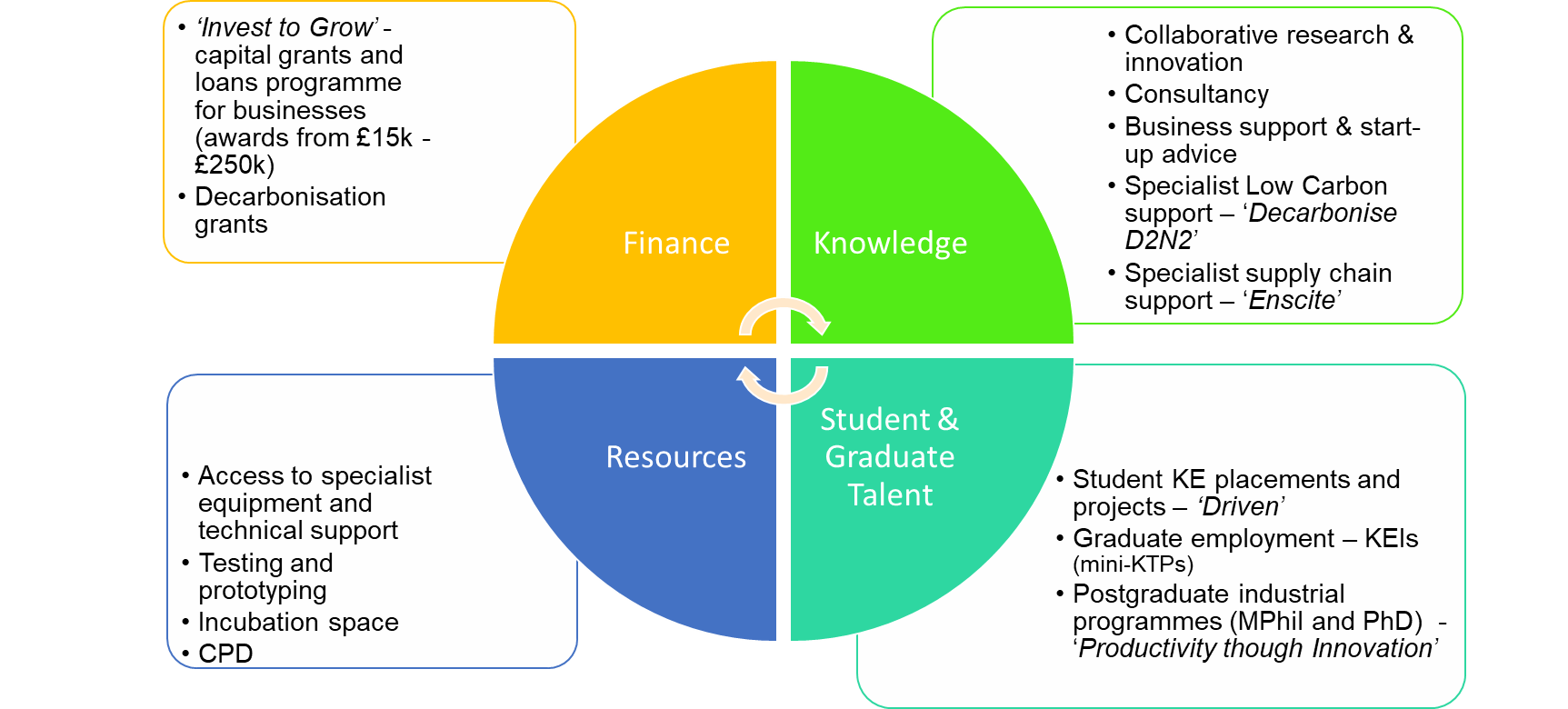
Within our portfolio we have specialist interventions focussing on our LEP’s key regional strategic priorities and key target sectors:
An ambitious carbon turn-around underpins the D2N2 Local Industrial Strategy. The University of Derby is decarbonising the D2N2 economy in partnership with Derby City and Derbyshire County Councils. Our Decarbonise project delivers a comprehensive package of support including carbon reduction audits and reports; technical support, consultancy and process improvement recommendations; cohort based learning and development for smart manufacturing and sustainable supply chain innovation; grant funding to implement carbon reduction recommendations.
D2N2 is home to many large and global aerospace, automotive and rail manufacturers and engineers. The University of Derby continues to provide specialist innovation and business support for the Transport Equipment Manufacturing sector including in partnership with Aston University and the University of Birmingham.
The reach of our portfolio includes support for businesses at all stages of development. We have supported graduate start-ups from our award winning Be the Boss Programme recognising the important role of new enterprise creation rates in successful local economies. We have also provided support to SMEs in key growth sectors seeking support to scale up.
Local Growth and Regeneration Led Capital Investment
Development of the University’s estate has also been strongly influenced by a regeneration imperative. For example, our collaboration with the Chesterfield Royal Hospital NHS Foundation Trust led to the establishment of a new University campus in Chesterfield involving a major restoration project to convert a Grade II listed building at a key gateway location from empty Council offices into a state of the art centre for nursing teaching and CPD.
This follows earlier regeneration projects restoring the Grade II 18th Century Devonshire Royal Hospital in Buxton and also stepping in to secure the future of Derby Theatre as a major arts and cultural venue in Derby City Centre by bringing the Theatre into the University of Derby Group and operating it as a learning theatre. Community regeneration is an important strand in the work of the theatre which delivers the Arts Council supported DerbyCAN programme creating city wide creative networks to co-curate and co-create with different communities.
More recently, capital investment in local growth projects has been focused on increasing research and innovation capacity in sectors aligned to local economic priorities. In 2019, 3 new capital demonstrators, as part of a Rail Research & Innovation Centre, were launched at the University of Derby with the support of the D2N2 LEP. This capital development reflects the importance of the rail sector to Derby and has already led to a new collaboration between the University of Derby, Rail Forum Midlands and the University of Birmingham to stimulate research and innovation led growth in the rail supply chain.

In 2020, capital co-investment from the D2N2 LEP was secured to establish new research and innovation capacity at the University of Derby in the bio-sciences. This investment will support efforts to diversify the Derby economy and improve its resilience to economic shocks which have had a particular impact on employment in Derby’s aerospace and advanced manufacturing sector. This latest capital investment will also ensure local access to skills pathways into the life sciences as a source of future jobs.
The University of Derby has also supported the development of a University of Derby Science Park on Infinity Park in Derby including through the Enscite project at the iHub innovation centre which also provides workspace for early stage and high growth SMEs in the aerospace, rail and automotive supply chains
Covid-19 Response
Our established regional networks have enabled the swift mobilisation of our resources as part of a Covid-19 pandemic response. 500 undergraduate and postgraduate pre-registration nursing students were deployed, a primary care hub facility was hosted at our main campus in Derby and stocks of personal protective equipment were handed over to hospitals in Derby and Derbyshire.
Academic teams also mobilised to support the local response effort. Economists from our Business School joined the LEP’s Covid-19 Analytical Group to ensure data could be provided quickly to inform evidence based recovery plans. The team at our Institute for Innovation in Sustainable Engineering worked throughout the pandemic in partnership with the NHS and local supply chains to design, prototype and produce face shields that were compliant with Grade 1 medical device standards.
Derby Theatre (part of the University of Derby Group) is also supporting the community with its ‘Derby Rises’ community arts project to celebrate the city’s emergence from quarantine and includes workshops to explore community groups’ responses to the pandemic and their hopes for their city.
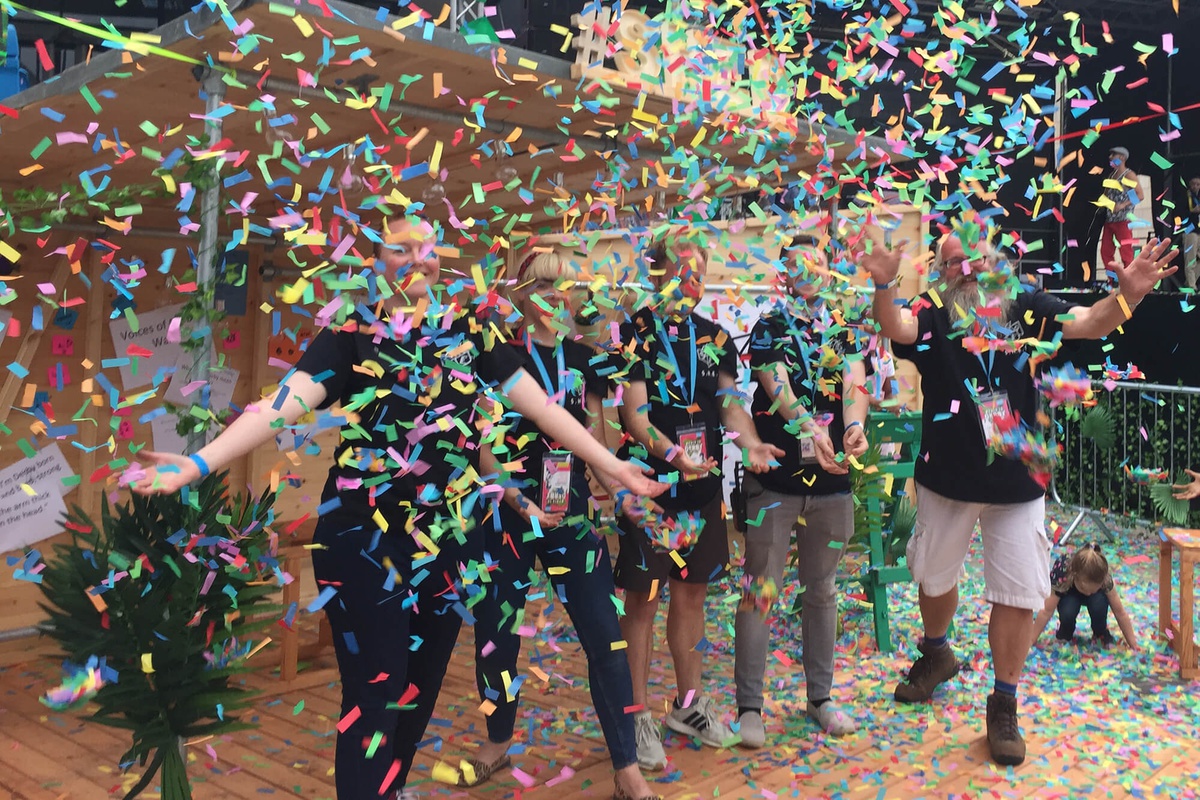
Aspect 3: Results
The infographic below illustrates some of the key outputs and outcomes of our activity.
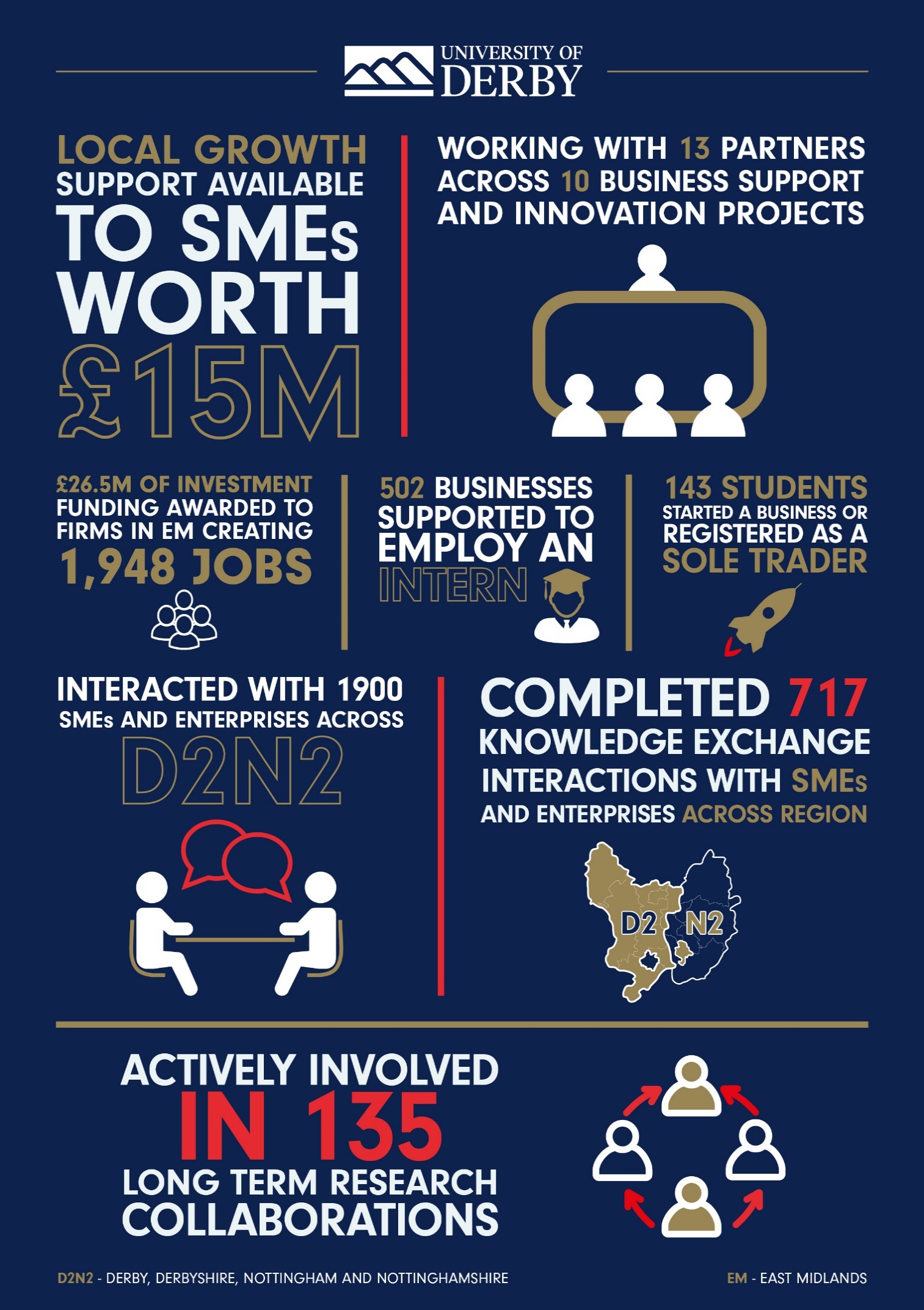
A key outcome from our project portfolio is the establishment of longer term collaborative relationships with businesses in our region. ‘Opening Doors’ applies not only to our student and graduate population but also our business community. Through our funded local growth programmes, we have been able to introduce businesses to collaboration with the HE sector and subsequently support them to move along the R&I value chain and build their capacity to engage, for example, with Innovate UK. Thus tangibly contributing to the Industrial Strategy target to increase business R&D spend.

This is evidenced in our growing portfolio of Innovate UK KTPs.
| 2015/16 | 2016/17 | 2017/18 | 2018/19 | |
|---|---|---|---|---|
| KTP Awards | £0.60m | £1.26m | £1.30m | £1.17m |
Impact on our student experience and graduate outcomes is a critically important outcome of our local growth and regeneration activity. We actively seek ways to link knowledge exchange projects and programmes back to our curriculum whether it be to inform research for a student start-up company or to create opportunities to enhance the employability of our students through rewarding placements and internships.
We undertake summative assessments of project activity as part of the project lifecycle.
The evidence gathered…suggests that Enabling Innovation support is encouraging businesses to think and behave differently in respect to innovation, which is leading to improved innovation capacities, strengthening relationships with the research base and improved business performance… just over half of respondents to our survey had improved business efficiency, productivity and business competitiveness. Around half had progressed a new technology/product/service towards market, again helping to reduce risk/uncertainty associated with R&D.
A Final Evaluation of Enabling Innovation, SQW, Feb 2019
The survey found that almost all business respondents felt that due to the support from Enscite there was enhanced knowledge and competency within the business; the majority felt that the business had greater aspirations/confidence to grow; and over half had accessed new customers/clients. Many businesses also reported economic impacts as a result of the Project’s support…38 per cent of businesses engaged had experienced job creation, whilst a further 31 per cent expected this to occur in the next year; 69 per cent of businesses had safeguarded existing jobs, whilst a further 13 per cent expected jobs to be safeguarded over the next year; and 31 per cent had experienced increased turnover, whilst a further 69 per cent expected to experience this over the next year.
Enscite Summative Assessment Report, Carney Green, Jan 2019
An impact assessment for our Invest to Grow project highlighted how the inclusion of a business finance intervention has tangibly extended our reach out to companies that would not previously have considered approaching a University for support.

We communicate results through a variety of channels including the stakeholder magazine, B2B e-shots, academic publications, webpages and events including specialist themed weeks e.g. Smart Cities and Communities.
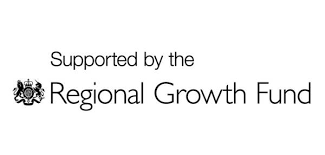
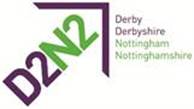

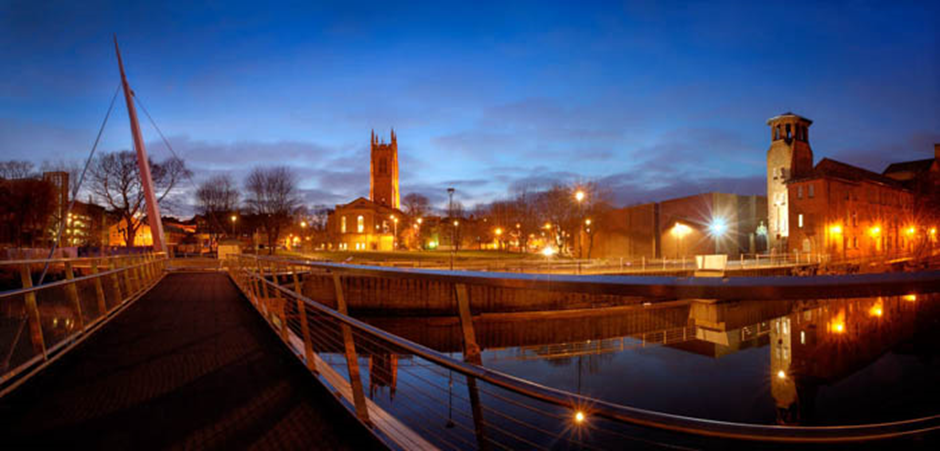
For further information, please send queries to g.davis@derby.ac.uk
Public & Community Engagement
Summary of approach
The University of Derby (UoD) champions research, innovation and social mobility, and is committed to raising aspirations and improving the education, skills, health and well-being of current and future generations across Derbyshire. Our public and community engagement strategy, activity and evaluation supports this ambition and is intended to positively impact the local communities and people within our region and beyond. Our engagement is underpinned by the Civic University Agreement and continues to evolve as UoD identifies community needs, and develops its understanding of the role that it can play in responding to them. HE-BCI data (2018-2019) quantifies that UoD researchers have delivered free public lectures to 16,816 people, free exhibitions to 13,621 visitors and free performances to 2,712 viewers.
Aspect 1: Strategy
Public and Community Engagement is a vital component of UoD’s Strategic Framework, 2018-2030. Produced in consultation with UoD’s staff, students and stakeholders, UoD’s strategic vision is underpinned by the promise that, “Everything we do is driven by delivering excellence and opportunities for our students, staff and our region.” UoD’s three strategic pillars for action reflect this:
Pillar 1: ‘Moulding the Next Generation of Game Changers’. UoD is committed to delivering an undergraduate and postgraduate curriculum that is industry relevant and shaped through engagement with external partners in charities and businesses. UoD’s Employer and Community Engagement Team (ECET) liaises with external partners to provide work placement and volunteering opportunities that are mutually beneficial to students and external partners. There is accountability to the Vice-Chancellors Executive (VCE) via the Provost (Academic and Student Experience).
Pillar 2: ‘Being a Force for Positive Impact’. UoD seeks to drive the economic, medical, social, cultural and educational prosperity of Derbyshire and beyond through the university’s publically and community engaged research, innovation and knowledge exchange. Central responsibility for the delivery of this pillar is located in the University Research and Knowledge Exchange Office (URKEO), with accountability to VCE by the Provost (Innovation and Research).
Pillar 3: ‘Opening Doors for Everyone’. UoD promotes social mobility and educational inclusion through focused engagement with schools in regional social mobility cold spots. This work is delivered by the Widening Access Team (WAT), with a Head of Widening Access. Accountability to VCE is by the Provost (Innovation and Research).
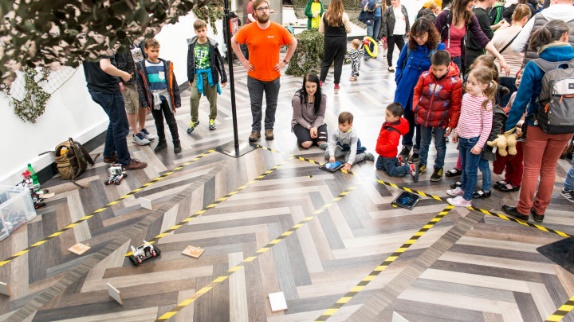
In 2020, UoD established a Civic and Community Committee (CCC) to strategically lead and promote the Civic University agenda. Chaired by the PVC Dean for Arts, Humanities and Education (AHE), the CCC includes external representation (Derby City Council, Derby County Community Trust and Derby County Council). Additionally, Corporate Communications and URKEO jointly share responsibility for UoD’s commitment to NCCPE’s Public Engagement Manifesto.
Aspect 2: Support
Through institutional investment, training opportunities and specialist teams, central professional services staff support the four Colleges to deliver on UoD’s public and community engagement. UoD’s four Colleges are: 1) Health, Psychology and Social Care (HPSC); 2) Business, Law and Social Sciences (BLSS); 3) Science, Engineering and Technology (SET); 4) AHE. Central services include:
ECET. This team works with the Colleges to help external partners fulfil their placement and volunteering needs by promoting vacancies to students and graduates; hosting skills webinars, interviews and assessment centres; campus and virtual careers fairs.
URKEO supports College researchers to form external partnerships, write funding applications (Innovate UK, Research Councils, charities) and handle post-award administration. A permanent Researcher (Impact) provides advice, training and resources in relation to planning, doing and evaluating public engagement and writing REF Impact Case Studies.
WAT support the Colleges and work externally with schools to provide outreach activity designed to improve attainment, support the development of young people’s ambitions and raise awareness of UoD’s Higher Education offer/ alternative pathways to progression.
Allied to the Civic Agenda, Corporate Communications and Marketing support staff to communicate their engagement activity internally and externally (local, national, international press, broadcast, social media, Twitter 42.2K followers, Instagram 19K followers, You Tube 16.7K subscribers). UoD’s Marketing team administer the UoD website and publish, The University of Derby Blog, which hosts free, accessibly written UoD academic content. A central ‘Contact Us’ page on UoD’s website provides campus contact points and email addresses for the Business Gateway and Corporate Communications.
Additionally, Colleges have their own support structures for public engagement. These differ and have evolved according to need. For example, in terms of internal REF 2021 investment funding, fixed-term Impact Officers were employed by HPSC and AHE. By contrast, BLSS, which had engagement/ evaluation expertise, chose to invest in research and administration positions.
Permanent staff have an annual performance review (objectives, needs, pathways to promotion). For research and teaching staff there is a Professional Practice route to Associate Professor which recognises successful knowledge exchange activity. The annual URKEO conference celebrates knowledge exchange and impactful research. A panel session convenes researchers and external partners to discuss best practice engagement.
As exemplified by the CCC (Aspect 1), the expertise of non-HE professionals is also present through advisory/ governance roles. For example, Board members of Derby Theatre (owned by UoD) includes the former Executive Producer of English Touring Theatre and the Director of Participation at Northern Stage. Equally, the Trustees of the Multi-Faith Centre, a separate registered charity based at UoD’s Kedleston Road campus, includes members of the Christian, Muslim, Sikh, Hindu and Jewish communities, while its Chair of Trustees is the Bishop of Derby, Libby Lane.
Aspect 3: Activity
Public engagement activities supported by central services and enacted by the Colleges demonstrate UoD’s commitment to the Civic Agenda and UoD’s Strategic Framework, 2018 – 2030:
Robust evaluations show that ECET have brought mutual benefits to charities, businesses and UoD students. All second years undertake work experience projects (30 hours+) and this is predominantly in local businesses/charities/schools (eg. Ashgate Primary School, Nottingham Playhouse, Burton Football Club, Oxfam, YMCA, Upbeat Communities). The Employer Mentoring Scheme pairs 40 students and local employers including mentors from Children First Derby and Quad. Mentors benefit from free training/ development opportunities. The Volunteering Team work with a range of local and national charities (663 opportunities advertised September 2019 - June 2020). They also sit on the CommUNIty Chesterfield board, a National Lottery Community Fund supported collaborative partnership between UoD and Derby Voluntary Action, supporting health and well-being.
URKEO are supporting 27 REF2021 Impact Case Studies, many of which evidence best practice in research informed public engagement benefitting Derbyshire and
beyond. Influenced by working with Chesterfield Royal Hospital, HPSC has created national online capacity building networks for clinical nurse educators (CNEnet), and through its Nature Connectedness research has shaped the public engagement strategy of The Wildlife Trust and the National Trust. Collaborating with Derby Theatre, BLSS has worked on arts projects (Plus One, #ThisisDerbyProject) that engage young people in care and/or in social mobility cold spots, building essential skills/ cultural confidence (shortlisted for The Guardian 2020 award for social and community impact). SET’s Audio-Engineering expertise has engaged the public at world leading music events (Glastonbury Festival) and has influenced World Health Organization public regulatory frameworks for safe listening. AHE has supported the civic agenda regionally from co-curating the international biennial FORMAT photography festival (delivered in Derby with QUAD) to public engagement with lesser known histories of the Derby Enlightenment (Being Human Festival 2019).
WAT improves the life chances of people within and beyond the region by addressing barriers to access through Progress to Success (P2S) and WAT’s leadership of the Derbyshire and Nottinghamshire Collaborative Outreach Programme (DANCOP). P2S reaches out to pupils in local, social mobility cold spots and provides progressive programmes of activities for Year 7-11 pupils across Derbyshire (experience days, summer schools, mindfulness workshops). DANCOP works with teachers and advisors, parents, carers and learners to break-down barriers that may prevent young people progressing to HE. During 2018/19, 6,521 DANCOP activities were delivered, engaging 59% of the target population, significantly above the government target (20%). Demonstrating external quality recognition, UoD won ‘University of the Year’ (UK Social Mobility Awards 2020).
Public engagement will be sustained through various revenue streams (student fees, REF/HEIF income, external project funding from Research Councils/ charities/ businesses/ government). Other opportunities being pursued include UoD established community interest companies (CIC). For example, S.H.E.D, a UoD CIC led by R.Jones, is an accessible pop-up art space, facilitating creative public dialogue. In 2019/2020, S.H.E.D engaged over 4000 people regionally, including 1351 school staff/ children, 187 arts practitioners; becoming shortlisted as a 2020 ‘Shed of the Year’.

Aspect 4: Results and learning
UoD understands that evaluation of engagement is essential in order to understand what activities are effective in fulfilling UoD’s strategic mission:
ECET. Second-year work experience projects are evaluated through a pre- and post-placement skills audit and an employer report form detailing organisational benefits from the placement. A 2019/2020 Skills Audit Report documents 750+ submissions, with overall increases in undergraduate skills. The Mentoring Scheme is evaluated through mentor and mentee feedback forms. The 2020/2021 Mentoring Scheme has been altered in response to feedback, creating more sector-based rather than skills pairings.
URKEO supports researchers to evaluate the outcomes of their engagement, improving their reflective research practice and fulfilling funder audit requirements (eg. ResearchFish, REF Impact, ERDF). The URKEO Intranet has an evaluation page and the University of Derby Online Research Archive provides closed access storage for Impact Case Study evaluative data (eg. surveys, testimonials). Evaluation methods employed by researchers are heterodox, varying depending on project size, participant engagement needs and project team skill-sets. Small projects are often evaluated ‘in-house’, while large public engagement projects such as FORMAT19 use independent evaluators (S4W). This evaluation demonstrated that photography festival visitors generated £1,148m, while 48% of the audience rated the overall quality of FORMAT19 as ‘excellent’ and a further 47% as ‘very good’. Showing that the curatorial team understand audience needs ahead of plans for FORMAT21, audience retention statistics show that 31.5% of surveyed FORMAT19 visitors had attended in 2017, while 24.2% had attended in 2015. Additionally, many researchers at UoD are published evaluation experts (Allwork, Cowling, Richardson, Neary, Nunn).
WAT evaluate PS2 and DANCOP through a combination of longitudinal tracking and targeted short-term evaluative interventions. They are part of the East Midlands Widening Participation and Research and Evaluation Partnership which allows UoD to track young people that they have engaged with throughout their long-term educational lifecycle. Data from this analysis is combined with techniques such as pre-and post-intervention surveys, focus groups, teacher evaluations and student reflexive diaries to assess programme success. For example, PS2 focus group evidence highlights increased student confidence/ motivation. This confidence continues into university, where in 2018/19, 54% of students enrolling at UoD from target schools were from the lowest participation areas (POLAR 4 data). 47.1% were from the most deprived areas (using IMD data).
Aspect 5: Acting on results
As Aspect 1 outlines, ultimate accountability for the implementation of the institution’s strategic aims and critical reflection on this process lies with the Vice-Chancellor’s Executive (VCE). VCE are assisted in this by UoD’s Strategic Insights Team which provides Institutional Lead Indicator reports, quantitatively benchmarking progress in student placements, widening access and research informed engagement activity. In terms of sharing practice, UoD Corporate Communications provides internal (‘Derby Daily’, fortnightly ‘Impact Bulletin’) and external opportunities for staff to reflect on engagement outcomes. Additionally:
ECET. Internally and externally reflects on best practice through annual employability awards event. The team promotes volunteering activity through a monthly newsletter. Feeding findings from UoD’s institutional practice back into the Higher Education sector, UoD’s Senior Volunteering Officer (Kebell) is on the Committee for the national Student Volunteering Network.
URKEO. REF Steering Committee provides a forum to reflect on Impact Case Study progress and discuss future strategy for research-informed engagement. URKEO share findings with a range of external organisations. For example, UoD’s Researcher (Impact) (Allwork) is a member of the research team for an NCCPE project, exploring the impact of COVID-19 on university public engagement.
WAT. Sends bimonthly reports to each College reflecting on schools liaison activity. The team share knowledge with major conferences/ organisations in the sector. For example, the Head of Widening Access (Bainham), has published a chapter on the evaluative findings of P2S in a 2019 FACE publication. Ensuring efficacy, P2S’s Theory of Change model is reviewed annually.
The recent formation of the CCC was shaped by consultative events with local stakeholders (Civic Forum, 27 June 2019) which prompted constructive reflection on UoD’s Strategy. Exemplifying UoD’s responsive civic commitment, its resources were mobilised to engage groups about COVID-19. Specific engagement interventions included: the creation of guides for difficult conversations about end of life care and the free online distribution of lockdown Nature Connectedness well-being resources.
For further information, please send queries to L.Allwork@derby.ac.uk